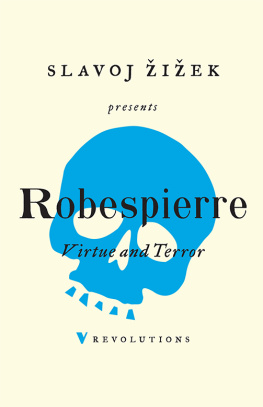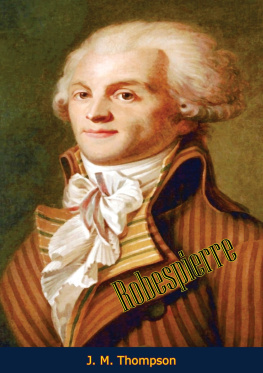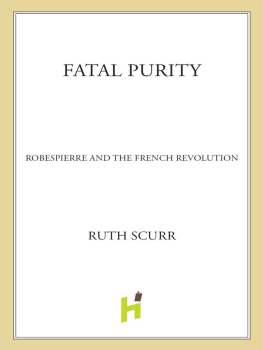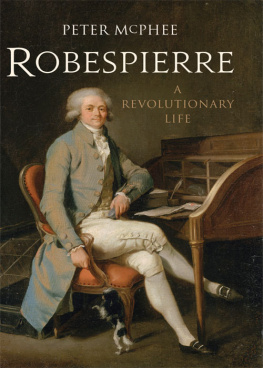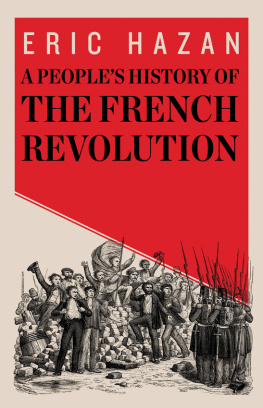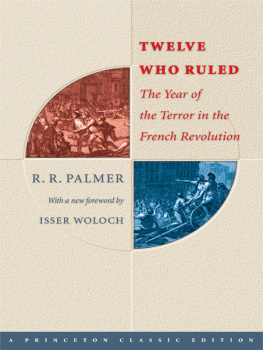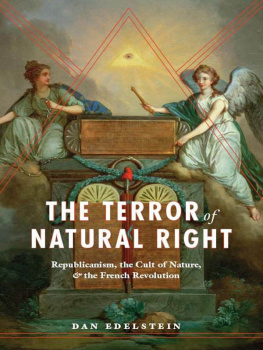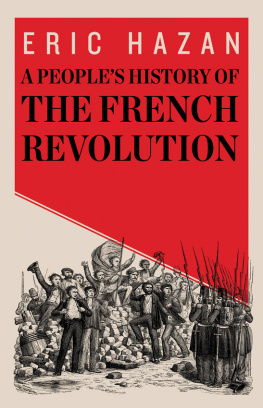A series of classic texts by revolutionaries in both thought and deed.
Each book includes an introduction by a major contemporary writer
illustrating how these figures continue to speak to readers today.
VIRTUE
AND TERROR

MAXIMILIEN ROBESPIERRE
INTRODUCTION BY SLAVOJ IEK
TEXTS SELECTED AND ANNOTATED BY JEAN DUCANGE
TRANSLATION BY JOHN HOWE

This edition published by Verso 2017
Translation John Howe 2007, 2017
Introduction Slavoj iek 2007, 2017
All rights reserved
The moral rights of the authors and translator have been asserted
1 3 5 7 9 10 8 6 4 2
Verso
UK: 6 Meard Street, London W1F 0EG
US: 20 Jay Street, Suite 1010, Brooklyn, NY 11201
versobooks.com
Verso is the imprint of New Left Books
ISBN-13: 978-1-78663-337-8
ISBN-13: 978-1-78663-339-2 (US EBK)
ISBN-13: 978-1-78663-338-5 (UK EBK)
British Library Cataloguing in Publication Data
A catalogue record for this book is available from the British Library
Library of Congress Cataloging-in-Publication Data
Names: Robespierre, Maximilien, 17581794. | Zizek, Slavoj, contributor.
Title: Virtue and terror / Maximilien Robespierre; introduction by Slavoj Zizek; texts selected and annotated by Jean Ducange; translation by John Howe.
Description: 2017 edition. | London; Brooklyn, NY: Verso, [2017] | Series:
Revolutions | Series: Virtue and terror | Originally published: Verso 2007. | Includes bibliographical references.
Identifiers: LCCN 2017025009 | ISBN 9781786633378 (pbk.) | ISBN 9781786633385
(uk e-book)
Subjects: LCSH: Robespierre, Maximilien, 17581794Political and social
views. | France-History-Revolution, 17891799. | Political
violenceFranceHistory18th century.
Classification: LCC DC146.R6 A25 2017 | DDC 944.04092dc23
LC record available at https://lccn.loc.gov/2017025009
Typeset in Bembo by Hewer Text UK Ltd, Edinburgh
Printed in the UK by CPI Mackays, UK
CONTENTS
ROBESPIERRE, OR, THE DIVINE
VIOLENCE OF TERROR
Slavoj iek
When, in 1953, Zhou Enlai, the Chinese Prime Minister, was in Geneva for the peace negotiations to end the Korean War, a French journalist asked him what he thought about the French Revolution; Zhou replied: It is still too early to tell. In a way, he was right: with the disintegration of the peoples democracies in the late 1990s, the struggle for the historical significance of the French Revolution flared up again. The liberal revisionists tried to impose the notion that the demise of Communism in 1989 occurred at exactly the right moment: it marked the end of the era which began in 1789, the final failure of the statist-revolutionary model which first entered the scene with the Jacobins.
Nowhere is the dictum every history is a history of the present more true than in the case of the French Revolution: its historiographical reception always closely mirrored the twists and turns of political struggles. The identifying mark of all kinds of conservatives is its flat rejection: the French Revolution was a catastrophe from its very beginning, the product of the godless modern mind; it is to be interpreted as Gods punishment for the humanitys wicked ways, so its traces should be undone as thoroughly as possible. The typical liberal attitude is a differentiated one: its formula is 1789 without 1793. In short, what the sensitive liberals want is a decaffeinated revolution, a revolution which doesnt smell of revolution. Franois Furet and others thus try to deprive the French Revolution of its status as the founding event of modern democracy, relegating it to a historical anomaly: there was a historical necessity to assert the modern principles of personal freedom, etc., but, as the English example demonstrates, the same could have been much more effectively achieved in a more peaceful way Radicals are, on the contrary, possessed by what Alain Badiou called the passion of the Real: if you say A equality, human rights and freedoms you should not shirk from its consequences but muster the courage to say B the terror needed to really defend and assert the A.
However, it is all too easy to say that todays Left should simply continue along this path. Something, some kind of historical cut, effectively took place in 1990: everyone, todays radical Left included, is somehow ashamed of the Jacobin legacy of revolutionary terror with its state-centralized character, so that the commonly accepted motto is that the Left, if it is to regain political effectiveness, should thoroughly reinvent itself, finally abandoning the so-called Jacobin paradigm. In our post-modern era of emergent properties, the chaotic interaction of multiple subjectivities, free interaction rather than centralized hierarchy, the multitude of opinions instead of one Truth, the Jacobin dictatorship is fundamentally not to our taste (the term taste should be given all its historical weight, as the name for a basic ideological disposition). Can one imagine something more foreign to our universe of the freedom of opinions, of market competition, of nomadic pluralist interaction, etc., than Robespierres politics of Truth (with a capital T, of course), whose proclaimed goal is to return the destiny of liberty into the hands of the truth? Such a Truth can only be enforced in a terrorist manner:
If the mainspring of popular government in peacetime is virtue, the mainspring of popular government in revolution is both virtue and terror: virtue, without which terror is disastrous; terror, without which virtue is powerless. Terror is nothing but prompt, severe, inflexible justice; it is therefore an emanation of virtue; it is not so much a specific principle as a consequence of the general principle of democracy applied to our homelands most pressing needs.
Robespierres line of argumentation reaches its climax in the paradoxical identification of the opposites: revolutionary terror sublates the opposition between punishment and clemency the just and severe punishment of the enemies is the highest form of clemency, so that, in it, rigour and charity coincide:
To punish the oppressors of humanity: that is clemency; to forgive them is barbarity. The rigour of tyrants has that rigour as its sole principle: that of the republican government is based on beneficence.
What, then, should those who remain faithful to the legacy of the radical Left do with all this? Two things, at least. First, the terrorist past has to be accepted as ours, even or precisely because it is critically rejected. The only alternative to the half-hearted defensive position of feeling guilty in front of our liberal or Rightist critics is: we have to do the critical job better than our opponents. This, however, is not the entire story: one should also not allow our opponents to determine the field and topic of the struggle. What this means is that the ruthless self-critique should go hand in hand with a fearless admission of what, to paraphrase Marxs judgement on Hegels dialectics, one is tempted to call the rational kernel of the Jacobin Terror:
Materialist dialectics assumes, without particular joy, that, till now, no political subject was able to arrive at the eternity of the truth it was deploying without moments of terror. Since, as Saint-Just asked: What do those who want neither Virtue nor Terror want? His answer is well-known: they want corruption another name for the subjects defeat.

